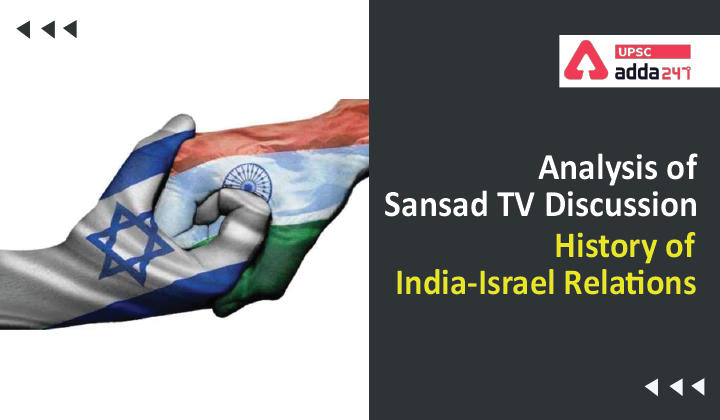Table of Contents
History of India-Israel Relations
Relevance
”GS 2: Bilateral Groupings & Agreements, Groupings & Agreements Involving India and/or Affecting India’s Interests, Effect of Policies & Politics of Countries on India’s Interests”
Introduction
- On January 30, India and Israel marked 30 years of full diplomatic relations.
- The history of the relationship between the two countries is very old. There has been a strong relationship between the people of India and Israel for centuries.
- During the years since the establishment of diplomatic relations, much progress has been made on the bilateral level.
- India is increasingly becoming central to Israel’s policy, politically, commercially, in science and culture. Israel is appreciative of the fact that Jews in India were never persecuted.
- With the 2020 Abrahamic Accords that saw UAE, Bahrain, Sudan and Morocco normalising relations with Israel and India’s own newly strengthened ties with the UAE and Saudi Arabia, New Delhi is now more confident about its key relationships in West Asia than at any other time.
Background
- Though India had recognised Israel on September 17, 1950, full-fledged diplomatic relations between the countries were established on January 29, 1992.
- Since then, the bilateral relations between both countries have developed into multifaceted strategic partnerships.
- Israel opened its embassy in Delhi on February 1, 1992.
- The Indian Embassy in Tel Aviv opened on May 15 that year.
How Leaders Reacted?
- Israeli PM Naftali Bennett addressed “all the people of India” on “30 years of a wonderful partnership, deep cultural connection and economic and military co-operation”, and described as “endless” the opportunities for collaboration between the two countries.
- Modi spoke about setting new goals to take the relationship forward and referred to Jewish communities in India who had lived here without discrimination for centuries.
- Foreign Ministers of India and Israel Emphasized that “friendship and trust” are not only positive traits but also “real assets” between the two countries.
Modi’s Israel Visit
- Modi’s famous visit in 2017 was the first by an Indian Prime Minister, and with that, he took full ownership of a relationship that had mostly grown under the radar for over a quarter-century.
- During his visit, Seven agreements were signed between the two countries.
History of India-Israel Ties
- India had recognised Israel as far back as 1950 but normalisation took another four decades. In the wake of the first Gulf War, equations in West Asia underwent big shifts. Arab support for the Palestinian cause began to weaken due to PLO’s backing for Iraq’s invasion of Kuwait. Then came the breakup of the Soviet Union, which was until then India’s go-to country for military hardware.
- From 1992, while there were defence deals, and cooperation in science, technology and agriculture, India was reticent about its ties with Israel as it balanced this with its historical support for the Palestinian cause, its dependence on the Arab world for oil, and the pro-Palestinian sentiments of the country’s Muslim citizens.
- But the first high-level visits took place only when the NDA-1 under Prime Minister Atal Bihari Vajpayee took office. In 2000, L K Advani became the first Indian minister to visit Israel. The same year, Jaswant Singh visited as Foreign Minister. That year, the two countries set up a joint anti-terror commission. And in 2003, Ariel Sharon became the first Israeli Prime Minister to visit India.
- Unlike his predecessors, Modi went all out to woo Israel, playing to Hindutva’s natural affinity for Israel as a muscular state that gives no quarter to its “terrorist” enemies.
India’s Palestinian policy & Its Relations with Israel
- Even as it abstained at UNESCO in December 2017, India voted in favour of a resolution in the General Assembly opposing the Trump administration’s recognition of Jerusalem as the Israeli capital.
- At the UNHRC’s 46th session in Geneva earlier in 2021, India voted against Israel in three resolutions – on the right of self-determination of the Palestinian people; on Israeli settlement policy; and on the human rights situation in the Golan Heights.
- It abstained on a fourth, which asked for an UNHRC report on the human rights situation in Palestine, including East Jerusalem.
- In February 2021, the International Criminal Court claimed jurisdiction to investigate human rights abuses in Palestinian territory including West Bank and Gaza and named both Israeli security forces and Hamas as perpetrators.
- Then PM Netanyahu wanted India, which does not recognise the ICC, to take a stand against it, and was surprised when it did not come.
- The Indian statement in the UNSC was another disappointment for Israel. But it did not affect the relationship as both countries weigh their long term interests against the fast-changing geopolitics of West Asia. Both will be hoping that the Pegasus episode will similarly blow over without any major impact on bilateral ties.
Conclusion
At a time when significant changes are taking place in the world, the importance of India-Israel ties has further increased. There cannot be a better opportunity than now for setting new goals for mutual cooperation when India is marking 75 years of its independence, Israel will mark 75 years of its independence next year and the two countries are marking 30 years of their diplomatic ties.


 TSPSC Group 1 Question Paper 2024, Downl...
TSPSC Group 1 Question Paper 2024, Downl...
 TSPSC Group 1 Answer key 2024 Out, Downl...
TSPSC Group 1 Answer key 2024 Out, Downl...
 Cabinet Ministers of India 2024, New Cab...
Cabinet Ministers of India 2024, New Cab...







